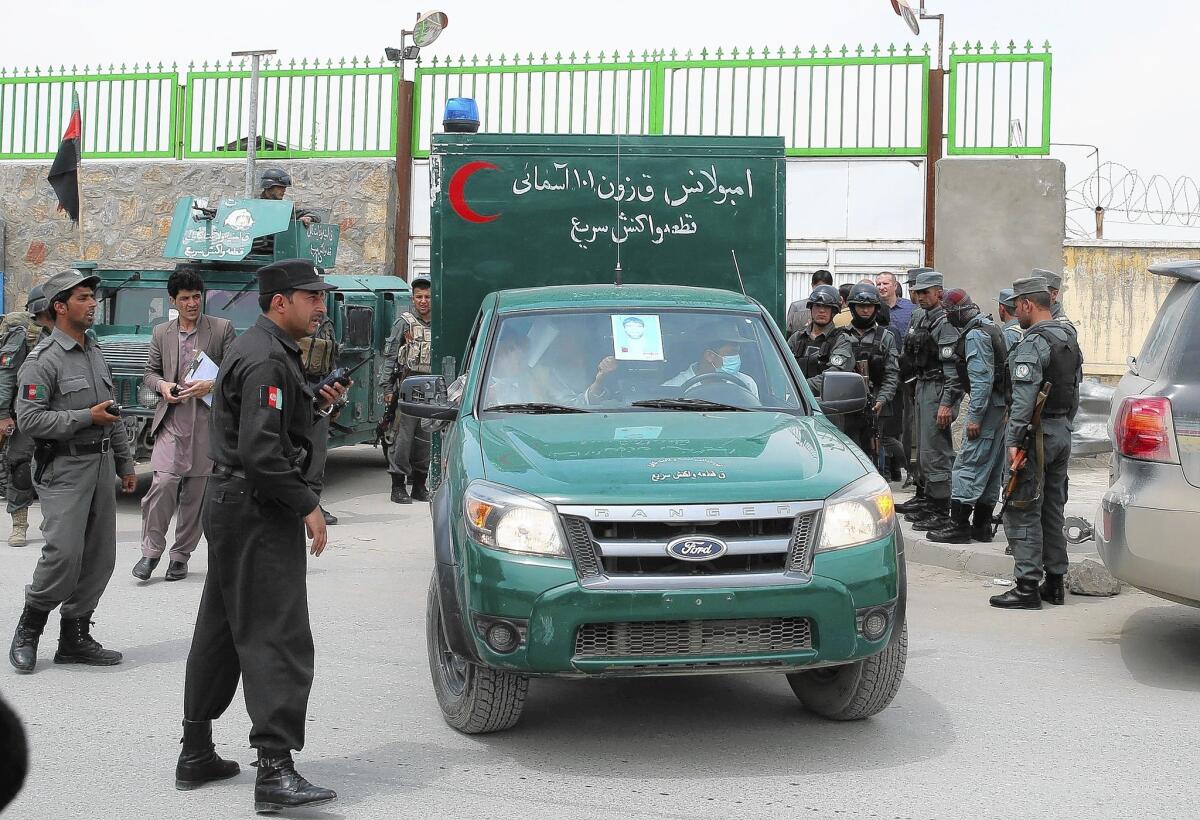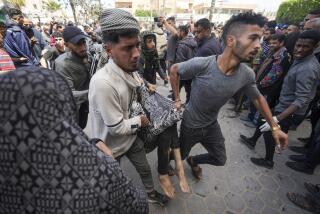Killing of Americans at Kabul hospital highlights foreigners’ risk

KABUL, Afghanistan — The fatal shooting of three Americans in a charity hospital Thursday punctuated a dismal new trend that has emerged in the waning months of the U.S.-led war in Afghanistan: Just as many foreign civilians are being killed as troops.
The brazen attack by a police officer at the CURE International hospital in Kabul, which serves 37,000 Afghans a year, shocked even this war-weary city and seemed likely to diminish the already dwindling population of foreigners working in the capital.
At least 22 foreign civilians have been killed this year in attacks on nonmilitary targets, including a Lebanese restaurant, a luxury hotel and foreign journalists covering preparations for the April 5 presidential election. The toll matches the number of U.S.-led coalition troops who have died this year, although nine of those fatalities resulted from non-hostile incidents.
As international forces accelerate their withdrawal, Afghan soldiers and police officers have taken on the brunt of security responsibilities. The Taliban and its sympathizers, meanwhile, have infiltrated those forces to perpetrate “insider” attacks against international troops.
Now some worry that insurgents have altered their tactics, electing to hit lightly guarded targets to keep pressure on Western countries even though their remaining military forces — including about 30,000 American soldiers — are stationed far from the front lines.
“They can be seen as the soft underbelly of the intervention, an easy way to hit Western governments rather than trying to fight well-armed NATO forces, and potentially a highly effective way of driving foreign aid and influence out of Afghanistan,” Kate Clark, country director for the Afghanistan Analysts Network, a Kabul-based research organization, wrote recently.
The Taliban denied responsibility for Thursday’s shooting, just as they did early this month after a police officer shot two Associated Press journalists who were part of a convoy of election workers in Khowst province, in eastern Afghanistan.
The attack Thursday occurred about 9:30 a.m. in west Kabul at what has become one of the capital’s leading medical facilities. Established in 2005 by CURE International, a Pennsylvania-based Christian charity that runs hospitals and health programs in 29 countries, the hospital specializes in maternal and child health. It also treats birth defects such as fistula and cleft lip and trains Afghan doctors, nurses and midwives.
That staff Thursday found itself treating its own colleagues and the gunman, who shot himself. He was turned over to Afghan authorities.
Hospital officials identified one of the victims as Dr. Jerry Umanos, who divided his practice between Kabul and Lawndale Christian Health Center in Chicago. In 2005, Umanos and his wife, Jan, moved to Afghanistan, where he was coordinating one of the country’s only training programs for doctors, according to a profile on Lawndale’s website.
“He was a great person, a great doctor. It’s a great loss,” said Umanos’ mother-in-law, Angie Schuitema. “He was doing what he wanted to do. He thanked God for allowing him to help people there.”
Lately, however, Umanos had grown worried about his safety in Kabul, telling a friend in the United States that he had been shot at while jogging.
“He was obviously concerned,” said the friend, Art Jones, a doctor who twice visited Umanos in Kabul. “At the same time, you can’t count the number of children that Jerry’s impacted, the lives he’s saved on his own and with the doctors he trained. That’s who he was. He was driven by the kids.”
The CURE hospital, along a busy highway, is regarded as more modern and sanitary than most in Afghanistan, and patients sometimes travel hours by bus to get treatment there. It is guarded by a few private security personnel in addition to Afghan police stationed at nearby checkpoints.
An officer at the closest checkpoint came into the hospital through a visitors entrance and fired on Umanos and two American visitors he was greeting, Afghan security officials said. The pair, a father and son, were not part of the hospital’s staff, said Dr. Yousof Khan, the hospital’s deputy director. The gunman also wounded a fourth American whose affiliation with the hospital was unclear, Khan said.
No patients or other staff members were injured, a CURE statement said.
The hospital isn’t the only medical facility in Kabul with foreign doctors, but Afghan officials declined to speculate on whether its Christian affiliation would have made it a target of insurgents.
Last month, Taliban insurgents attempted to attack a Christian-run day-care center that they accused of trying to convert Afghans to Christianity. However the assailants mistakenly struck a compound next door that belonged to an American aid contractor, triggering a firefight with security guards that left an Afghan girl, a driver and all five attackers dead.
In attacks since the beginning of January, a Swedish-British journalist was shot to death on a Kabul street, 13 foreigners and eight Afghans were killed in a commando-style raid on a Lebanese restaurant, four foreigners and five Afghans were killed in an attack on the exclusive Serena Hotel and Associated Press photographer Anja Niedringhaus, a German citizen, was shot and killed in Khowst. AP reporter Kathy Gannon, a Canadian citizen, was wounded in that shooting.
The Serena Hotel attack took place two weeks before the April 5 election to choose a successor to President Hamid Karzai, a milestone in Afghanistan that the Taliban denounced as a foreign plot. Several international election monitors were staying in the hotel, including one who was killed, Luis Maria Duarte of Paraguay.
After the incident, Duarte’s organization, the U.S.-based National Democratic Institute, withdrew its foreign staff from Afghanistan, as did another foreign observer group with the Organization for Security and Cooperation in Europe.
Kabul, which has long had a quiet but thriving nightlife for expatriates, was blanketed with an eerie silence in the weeks before the vote. Restaurants closed and dinner parties became scarce as foreigners curtailed their movements and many international agencies sent staff members out of the country.
The deteriorating security has prompted fear among many Afghans that they will lose much of the foreign aid that accounts for most of the country’s operating budget. U.S. lawmakers this year halved development funding for Afghanistan, to $1.1 billion, in part because of worsening relations with Karzai.
The hospital attack, some worry, may further reduce foreign assistance.
“This was an inhumane and brutal action, and unfortunately will impact our health services,” Health Minister Suraya Dalil told Reuters news agency.
Times staff writer Bengali reported from Mumbai, India, and special correspondent Baktash from Kabul. Times staff writer David Zucchino in North Carolina and Chicago Tribune staff writers Mitch Smith, Andy Grimm and Rosemary Regina Sobol in Chicago contributed to this report.
More to Read
Sign up for Essential California
The most important California stories and recommendations in your inbox every morning.
You may occasionally receive promotional content from the Los Angeles Times.











